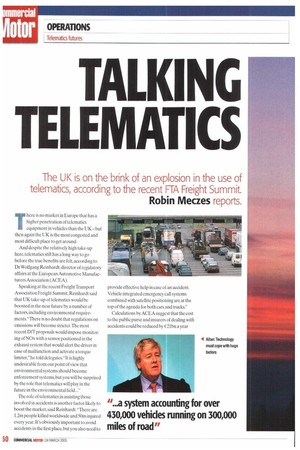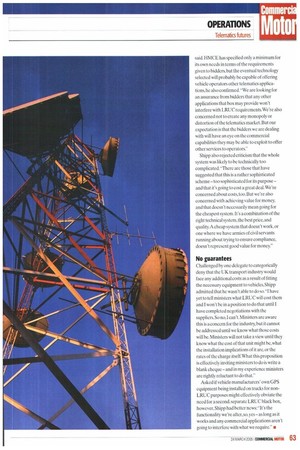TALKING TELEIVIATICS
Page 60

Page 62

Page 63

If you've noticed an error in this article please click here to report it so we can fix it.
The UK is on the brink of an explosion in the use of telematics, according to the recent FTA Freight Summit. Robin Meczes reports.
There is no market in Europe that has a higher penetration of telematics equipment in vehicles than the UK — but then again the UK is the most congested and most difficult place to get around.
And despite the relatively high take-up here. telematics still has a long way to go before the true benefits are felt, according to Dr Wolfgang Reinhardt, director of regulatory affairs at the European Automotive Manufacturers Association (ACEA).
Speaking at the recent Freight Transport Association Freight Summit, Reinhardt said that UK take-up of telematics would be boosted in the near future by a number of factors, including environmental requirements."7here is no doubt that regulations on emissions will become stricter.The most recent DfT proposals would impose monitoring of NOx with a sensor positioned in the exhaust system that would alert the driver in case of malfunction and activate a torque limiter," he told delegates."It is highly undesirable from our point of view that environmental systems should become enforcement systems.but you will be surprised by the role that telematics will play in the future in the environmental field..."
The role of telematics in assisting those involved in accidents is another factor likely to boost the market, said Reinhardt."There are 1.2m people killed worldwide and 50m injured every year. It's obviously important to avoid accidents in the first place. but you also need to provide effective help in case of an accident. Vehicle integrated emergency call systems combined with satellite positioning are at the top of the agenda for both cars and trucks."
Calculations by ACEA suggest that the cost to the public purse and insurers of dealing with accidents could be reduced by €2lbn a year and to install the necessary equipment in vehicles would be a fraction of that. But despite a lot of interest, the parties that would really gain from this seem unwilling to foot the bill,said Reinhardt."Those who would benefit are not putting their cards on the table. With electronic vehicle identification, there would be savings on the insurance side and on the tax side, not least in terms of the many people driving without paying for insurance. But not to talk about the savings and just force the automotive industry by regulation to put systems into vehicles and so force the cost onto the manufacturer is to try to get the savings without paying for them.That doesn't work.
Unity of purpose
think we could make major steps forward when everybody who stands to make those savings or is helped to protect their revenue puts their cards on the table and says 'that's what we can have, here are the costs', and then starts working on a joint business case together," says Reinhardt.
Road user charging is another area that will inevitably increase the usage of telematics systems, adds Reinhardt—especially given the EU Interoperability Directive which is designed to ensure that by July 2009 a single black box in each vehicle can cope with a variety of different charging schemes. And commercial vehicles now represent perhaps the most exciting sector of the market,he says. "Almost all the car manufacturers, with few exceptions, have stepped out of the business. But new impetus is expected to come from the introduction of standardised location-based emergency and roadside assistance services, dynamic real time road and traffic information and from commercial vehicle telematics."
Road user charging was, unsurprisingly, also on the mind of FTA president and Exel chief executive John Allan, who expressed concerns about who would end up paying for the telematics equipment likely to be required by the UK's lorry road user charge (LRUC)."The biggest uncertainty is the cost of installing and operating the collection system and administering the all-important rebate of fuel duty. The main reason for that uncertainty is because the technology to be used has not yet been specified," he says.
Whatever the technology eventually chosen, it will be crucial to the success of the scheme, adds Allan."Its success or otherwise will be determined by the ability of technology companies to reliably deliver and operate a system that accounts for over 430,000 vehicles running on 300,000 miles of road, consuming eight million litres of fuel and contributing over £4bn to the Treasury," he says."Until the technical attributes of the successfully tendered system become known, few of its hidden costs can be easily identified; nor can the full benefits be understood."
Proven technology
Mike Shipp, director of the LRUC project at HM Customs & Excise, gave the strongest indication yet that the technology to be employed would indeed be telematics-based. "I think it's probable that we will have onboard equipment and our bidders are telling us that GPS is a technology that is proven," he said. HMCE has specified only a minimum for its own needs in terms of the requirements given to bidders, but the eventual technology selected will probably be capable of offering vehicle operators other telematics applications, he also confirmed. -We are looking for an assurance from bidders that any other applications that box may provide won't interfere with LRUCrequirements.We're also concerned not to create any monopoly or distortion of the telematics market. But our expectation is that the bidders we are dealing with will have an eye on the commercial capabilities they may be able to exploit to offer other services to operators."
Shipp also rejected criticism that the whole system was likely lobe technically too complicated.-There are those that have suggested that this is a rather sophisticated scheme too sophisticated for its purpose and that it's going to cost a great deal. We're concerned about costs, too. But we're also concerned with achieving value for money, and that doesn't necessarily mean going for the cheapest system. It's a combination of the right technical system, the best price, and quality. A cheap system that doesn't work, or one where we have armies of civil servants running about trying to ensure compliance, doesn't represent good value for money."
No guarantees Challenged by one delegate to categorically deny that the UK transport industry would face any additional costs as a result of fitting the necessary equipment to vehicles,Shipp admitted that he wasn't able to do so.-I have yet to tell ministers what LRUC will cost them and I won't be in a position to do that until I have completed negotiations with the suppliers. So no, I can't. Ministers are aware this is a concern for the industry, but it cannot be addressed until we know what those costs will be. Ministers will not take a view until they know what the cost of that unit might be, what the installation implications of it are, or the rates of the charge itself. What this proposition is effectively inviting ministers to do is write a blank cheque and in my experience ministers are rightly reluctant to do that."
Asked if vehicle manufacturers' own GPS equipment being installed on trucks for nonLRUC purposes might effectively obviate the need for a second. separate LRUC black box, however. Shipp had better news: "It's the functionality we're after, so. yes as long as it works and any commercial applications aren't going to interfere with what we require." •










































































































































































































